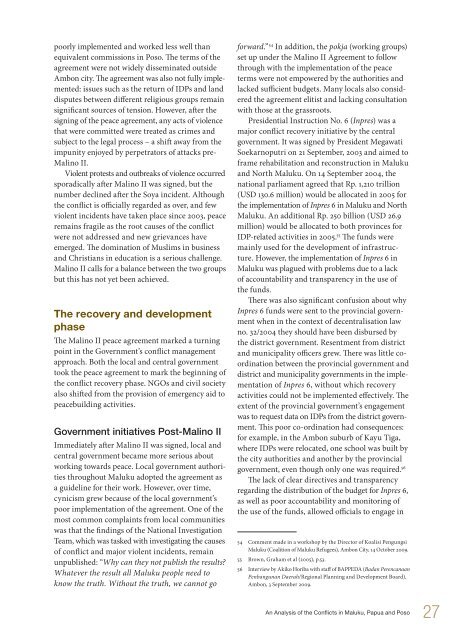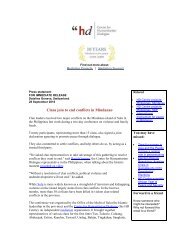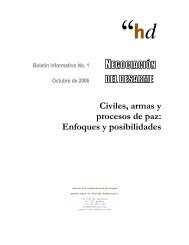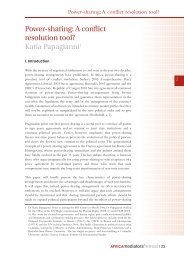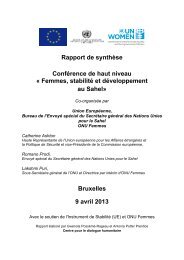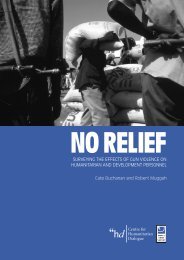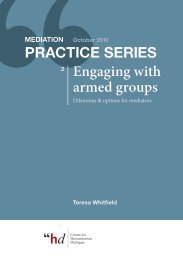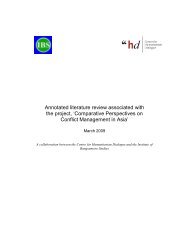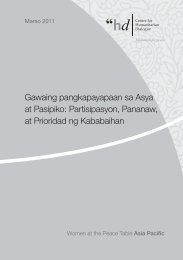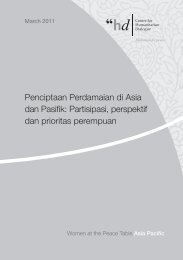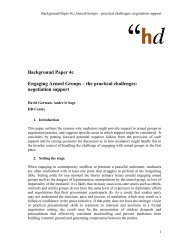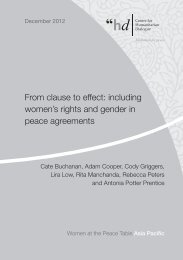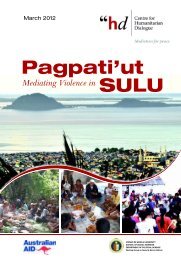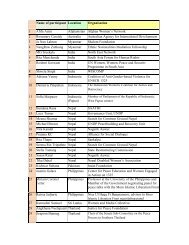Conflict Management in Indonesia â An Analysis of the Conflicts in ...
Conflict Management in Indonesia â An Analysis of the Conflicts in ...
Conflict Management in Indonesia â An Analysis of the Conflicts in ...
Create successful ePaper yourself
Turn your PDF publications into a flip-book with our unique Google optimized e-Paper software.
poorly implemented and worked less well than<br />
equivalent commissions <strong>in</strong> Poso. The terms <strong>of</strong> <strong>the</strong><br />
agreement were not widely dissem<strong>in</strong>ated outside<br />
Ambon city. The agreement was also not fully implemented:<br />
issues such as <strong>the</strong> return <strong>of</strong> IDPs and land<br />
disputes between different religious groups rema<strong>in</strong><br />
significant sources <strong>of</strong> tension. However, after <strong>the</strong><br />
sign<strong>in</strong>g <strong>of</strong> <strong>the</strong> peace agreement, any acts <strong>of</strong> violence<br />
that were committed were treated as crimes and<br />
subject to <strong>the</strong> legal process – a shift away from <strong>the</strong><br />
impunity enjoyed by perpetrators <strong>of</strong> attacks pre-<br />
Mal<strong>in</strong>o II.<br />
Violent protests and outbreaks <strong>of</strong> violence occurred<br />
sporadically after Mal<strong>in</strong>o II was signed, but <strong>the</strong><br />
number decl<strong>in</strong>ed after <strong>the</strong> Soya <strong>in</strong>cident. Although<br />
<strong>the</strong> conflict is <strong>of</strong>ficially regarded as over, and few<br />
violent <strong>in</strong>cidents have taken place s<strong>in</strong>ce 2003, peace<br />
rema<strong>in</strong>s fragile as <strong>the</strong> root causes <strong>of</strong> <strong>the</strong> conflict<br />
were not addressed and new grievances have<br />
emerged. The dom<strong>in</strong>ation <strong>of</strong> Muslims <strong>in</strong> bus<strong>in</strong>ess<br />
and Christians <strong>in</strong> education is a serious challenge.<br />
Mal<strong>in</strong>o II calls for a balance between <strong>the</strong> two groups<br />
but this has not yet been achieved.<br />
The recovery and development<br />
phase<br />
The Mal<strong>in</strong>o II peace agreement marked a turn<strong>in</strong>g<br />
po<strong>in</strong>t <strong>in</strong> <strong>the</strong> Government’s conflict management<br />
approach. Both <strong>the</strong> local and central government<br />
took <strong>the</strong> peace agreement to mark <strong>the</strong> beg<strong>in</strong>n<strong>in</strong>g <strong>of</strong><br />
<strong>the</strong> conflict recovery phase. NGOs and civil society<br />
also shifted from <strong>the</strong> provision <strong>of</strong> emergency aid to<br />
peacebuild<strong>in</strong>g activities.<br />
Government <strong>in</strong>itiatives Post-Mal<strong>in</strong>o II<br />
Immediately after Mal<strong>in</strong>o II was signed, local and<br />
central government became more serious about<br />
work<strong>in</strong>g towards peace. Local government authorities<br />
throughout Maluku adopted <strong>the</strong> agreement as<br />
a guidel<strong>in</strong>e for <strong>the</strong>ir work. However, over time,<br />
cynicism grew because <strong>of</strong> <strong>the</strong> local government’s<br />
poor implementation <strong>of</strong> <strong>the</strong> agreement. One <strong>of</strong> <strong>the</strong><br />
most common compla<strong>in</strong>ts from local communities<br />
was that <strong>the</strong> f<strong>in</strong>d<strong>in</strong>gs <strong>of</strong> <strong>the</strong> National Investigation<br />
Team, which was tasked with <strong>in</strong>vestigat<strong>in</strong>g <strong>the</strong> causes<br />
<strong>of</strong> conflict and major violent <strong>in</strong>cidents, rema<strong>in</strong><br />
unpublished: “Why can <strong>the</strong>y not publish <strong>the</strong> results?<br />
Whatever <strong>the</strong> result all Maluku people need to<br />
know <strong>the</strong> truth. Without <strong>the</strong> truth, we cannot go<br />
forward.” 54 In addition, <strong>the</strong> pokja (work<strong>in</strong>g groups)<br />
set up under <strong>the</strong> Mal<strong>in</strong>o II Agreement to follow<br />
through with <strong>the</strong> implementation <strong>of</strong> <strong>the</strong> peace<br />
terms were not empowered by <strong>the</strong> authorities and<br />
lacked sufficient budgets. Many locals also considered<br />
<strong>the</strong> agreement elitist and lack<strong>in</strong>g consultation<br />
with those at <strong>the</strong> grassroots.<br />
Presidential Instruction No. 6 (Inpres) was a<br />
major conflict recovery <strong>in</strong>itiative by <strong>the</strong> central<br />
government. It was signed by President Megawati<br />
Soekarnoputri on 21 September, 2003 and aimed to<br />
frame rehabilitation and reconstruction <strong>in</strong> Maluku<br />
and North Maluku. On 14 September 2004, <strong>the</strong><br />
national parliament agreed that Rp. 1,210 trillion<br />
(USD 130.6 million) would be allocated <strong>in</strong> 2005 for<br />
<strong>the</strong> implementation <strong>of</strong> Inpres 6 <strong>in</strong> Maluku and North<br />
Maluku. <strong>An</strong> additional Rp. 250 billion (USD 26.9<br />
million) would be allocated to both prov<strong>in</strong>ces for<br />
IDP-related activities <strong>in</strong> 2005. 55 The funds were<br />
ma<strong>in</strong>ly used for <strong>the</strong> development <strong>of</strong> <strong>in</strong>frastructure.<br />
However, <strong>the</strong> implementation <strong>of</strong> Inpres 6 <strong>in</strong><br />
Maluku was plagued with problems due to a lack<br />
<strong>of</strong> accountability and transparency <strong>in</strong> <strong>the</strong> use <strong>of</strong><br />
<strong>the</strong> funds.<br />
There was also significant confusion about why<br />
Inpres 6 funds were sent to <strong>the</strong> prov<strong>in</strong>cial government<br />
when <strong>in</strong> <strong>the</strong> context <strong>of</strong> decentralisation law<br />
no. 32/2004 <strong>the</strong>y should have been disbursed by<br />
<strong>the</strong> district government. Resentment from district<br />
and municipality <strong>of</strong>ficers grew. There was little coord<strong>in</strong>ation<br />
between <strong>the</strong> prov<strong>in</strong>cial government and<br />
district and municipality governments <strong>in</strong> <strong>the</strong> implementation<br />
<strong>of</strong> Inpres 6, without which recovery<br />
activities could not be implemented effectively. The<br />
extent <strong>of</strong> <strong>the</strong> prov<strong>in</strong>cial government’s engagement<br />
was to request data on IDPs from <strong>the</strong> district government.<br />
This poor co-ord<strong>in</strong>ation had consequences:<br />
for example, <strong>in</strong> <strong>the</strong> Ambon suburb <strong>of</strong> Kayu Tiga,<br />
where IDPs were relocated, one school was built by<br />
<strong>the</strong> city authorities and ano<strong>the</strong>r by <strong>the</strong> prov<strong>in</strong>cial<br />
government, even though only one was required. 56<br />
The lack <strong>of</strong> clear directives and transparency<br />
regard<strong>in</strong>g <strong>the</strong> distribution <strong>of</strong> <strong>the</strong> budget for Inpres 6,<br />
as well as poor accountability and monitor<strong>in</strong>g <strong>of</strong><br />
<strong>the</strong> use <strong>of</strong> <strong>the</strong> funds, allowed <strong>of</strong>ficials to engage <strong>in</strong><br />
54 Comment made <strong>in</strong> a workshop by <strong>the</strong> Director <strong>of</strong> Koalisi Pengungsi<br />
Maluku (Coalition <strong>of</strong> Maluku Refugees), Ambon City, 14 October 2009.<br />
55 Brown, Graham et al (2005), p.53.<br />
56 Interview by Akiko Horiba with staff <strong>of</strong> BAPPEDA (Badan Perencanaan<br />
Penbangunan Daerah/Regional Plann<strong>in</strong>g and Development Board),<br />
Ambon, 3 September 2009.<br />
<strong>An</strong> <strong>An</strong>alysis <strong>of</strong> <strong>the</strong> <strong>Conflict</strong>s <strong>in</strong> Maluku, Papua and Poso<br />
27


